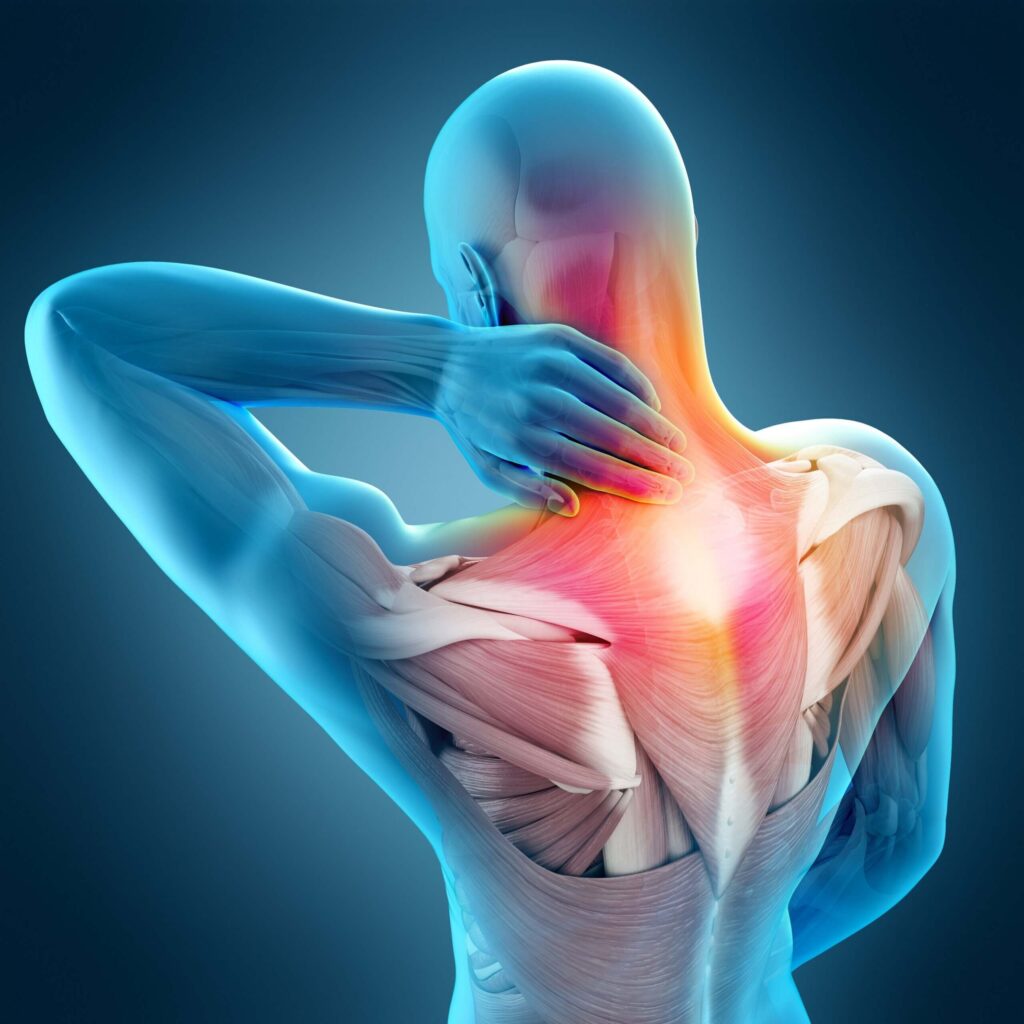The neck, a complex structure comprising vertebrae, muscles, ligaments, and nerves, plays a vital role in supporting the head’s weight and facilitating movement. However, many individuals frequently experience discomfort and pain due to muscle tightness in the neck. Whether you’ve woken up with a stiff neck or have been dealing with chronic tension, understanding the causes, symptoms, and effective management strategies for neck muscle tightness is essential for maintaining your overall well-being.
Contents
Causes of Muscle Tightness in Neck

Muscle tightness in the neck can result from a variety of factors, ranging from lifestyle habits to underlying medical conditions. Understanding these causes can help you take appropriate steps to prevent and manage neck muscle tightness. Here are some common causes:
- Poor Posture: Prolonged periods of sitting or standing with improper posture can strain the muscles in your neck. Slouching or holding your head in a forward position can lead to muscle imbalances and tension.
- Stress and Anxiety: Emotional stress and anxiety can lead to increased muscle tension throughout the body, including the neck. This is often referred to as “stress-induced muscle tension.”
- Repetitive Movements: Engaging in repetitive movements or activities that require you to hold your neck in a fixed position, such as looking down at a smartphone or computer for extended periods, can strain the neck muscles.
- Sleeping Position: Sleeping in an awkward or uncomfortable position, using a pillow that doesn’t provide proper support, or sleeping on a mattress that doesn’t offer adequate spinal alignment can contribute to neck muscle tightness.
- Muscle Strain: Overexertion, sudden movements, or lifting heavy objects can strain the muscles in the neck, leading to tightness and discomfort.
- Injury or Trauma: Accidents, falls, whiplash injuries, or sudden impacts can damage the soft tissues in the neck, causing muscles to tighten as a protective response.
- Medical Conditions: Certain medical conditions can contribute to neck muscle tightness. These include cervical spondylosis (degeneration of the cervical spine), herniated discs, fibromyalgia (a condition characterized by widespread pain and sensitivity), and temporomandibular joint disorder (TMJ), which can cause jaw and neck muscle tension.
Common Symptoms of Muscle Tightness in Neck
Muscle tightness in the neck can lead to a range of uncomfortable symptoms that can vary in intensity and duration. Recognizing these symptoms can help you identify when you’re experiencing neck muscle tightness and take appropriate steps to alleviate it. Here are some common symptoms associated with muscle tightness in the neck:
- Neck Pain: One of the most noticeable symptoms is localized or radiating pain in the neck area. The pain can range from a dull ache to sharp, stabbing sensations.
- Stiffness: Tight neck muscles often result in reduced flexibility and limited range of motion. You might find it challenging to turn your head or tilt it from side to side.
- Headaches: Muscle tension in the neck can lead to tension headaches. These headaches often manifest as a band-like pressure around the head or pain at the base of the skull.
- Shoulder Discomfort: The muscles in the neck are interconnected with those in the shoulders and upper back. Tightness in the neck can lead to referred pain or discomfort in the shoulder region.
- Jaw Tension: Muscle tightness in the neck can sometimes extend to the jaw, leading to jaw clenching or teeth grinding, especially during sleep.
- Numbness and Tingling: When neck muscles are tight, they can compress nearby nerves, causing sensations of numbness, tingling, or even weakness in the arms, hands, or fingers.
- Difficulty Moving: You may find it difficult to move your neck smoothly and without discomfort. Turning your head to check blind spots while driving or looking up to reach for something might be challenging.
How Does Muscle Tightness in Neck Impact Work?

Muscle tightness in the neck can significantly impact your ability to work in various ways, potentially affecting your comfort, productivity, and overall well-being. Here’s how muscle tightness in the neck can impact your work:
- Pain and Discomfort: Muscle tightness often causes pain and discomfort in the neck and surrounding areas. This pain can range from a dull ache to sharp, intense pain, making it difficult to concentrate on tasks and causing overall discomfort throughout the workday.
- Limited Range of Motion: Tight neck muscles can restrict your ability to move your head and neck freely. This limitation in range of motion can hinder your ability to interact with your workspace, colleagues, and equipment, affecting your efficiency and ability to perform tasks that require head movements.
- Posture Problems: Muscle tightness can lead to poor posture as your body may adopt awkward positions to relieve discomfort. Poor posture can contribute to additional strain on the neck, shoulders, and back, leading to further discomfort and potential long-term issues.
- Headaches: Muscle tension in the neck can trigger tension headaches that radiate from the neck to the head. These headaches can be distracting and impact your ability to focus on your work.
- Reduced Productivity: Dealing with pain and discomfort can slow down your work pace. You might find it challenging to concentrate, leading to decreased productivity and potential errors in your work.
Prevention and Management of Muscle Tightness in Neck
Preventing and managing muscle tightness in the neck involves a combination of lifestyle adjustments, self-care practices, and, in some cases, professional guidance. By adopting these strategies, you can reduce the likelihood of experiencing neck muscle tightness and effectively manage any discomfort that arises. Here’s a comprehensive guide:
Prevention
- Maintain Good Posture: Pay attention to your posture while sitting, standing, and walking. Keep your shoulders relaxed, your chin parallel to the ground, and your spine aligned.
- Ergonomic Workspace: Arrange your computer, keyboard, and chair to support proper posture. Position your monitor at eye level to avoid straining your neck while working.
- Regular Movement: Take breaks during prolonged activities and incorporate gentle neck stretches and movements into your routine to prevent muscle stiffness.
- Proper Pillow and Mattress: Invest in a pillow and mattress that provide adequate support for your neck and spine while sleeping. Your neck should be in a neutral position when lying down.
- Stress Management: Engage in relaxation techniques such as deep breathing, meditation, yoga, or mindfulness to reduce stress and prevent stress-induced muscle tension.
- Stay Hydrated: Drink sufficient water throughout the day to prevent muscle cramping due to dehydration.
- Regular Exercise: Engage in regular physical activity to maintain overall muscle strength and flexibility. Incorporate exercises that specifically target neck muscles.
- Balanced Diet: Consume a diet rich in nutrients, particularly calcium, magnesium, and potassium, which support muscle health.
- Avoid Carrying Heavy Bags: If you need to carry a bag, distribute the weight evenly or use a backpack to prevent strain on one side of your body.
Management
- Stretching: Perform gentle neck stretches regularly to maintain flexibility and alleviate muscle tension. Examples include neck tilts, neck rotations, and shoulder rolls.
- Heat and Cold Therapy: Apply a warm compress or take a warm shower to relax tight muscles. Cold packs can help reduce inflammation and numb pain.
- Massage and Self-Myofascial Release: Gentle massaging of the neck area or using tools like foam rollers and massage balls can help release muscle tension.
- Over-the-Counter Pain Relief: Non-prescription pain relievers like ibuprofen or acetaminophen can provide temporary relief from pain and discomfort. Consult a healthcare professional before use.
- Topical Pain Relief: Topical creams or ointments containing menthol, camphor, or capsaicin can provide localized pain relief.
- Physical Therapy: If muscle tightness is persistent, a physical therapist can provide tailored exercises and techniques to improve muscle strength and flexibility.
- Chiropractic Care: Chiropractic adjustments can help realign the spine and relieve tension in the neck muscles.
Home Remedies for Muscle Tightness in Neck
Here are some home remedies to consider:
- Rest: Give your neck muscles a break by avoiding activities that might strain them further. Try to maintain good posture, especially when sitting at a desk or using electronic devices.
- Heat Therapy: Applying heat can help relax and soothe tight muscles. You can use a warm towel, or heating pad, or take a warm bath or shower. Make sure the heat is not too intense to avoid burns.
- Cold Therapy: Applying cold packs or ice wrapped in a thin cloth to the affected area can help reduce inflammation and numb the pain. Remember to use a barrier between the ice and your skin to prevent frostbite.
- Gentle Neck Stretches: Perform gentle neck stretches to help relieve tension. Slowly move your head from side to side, up and down, and gently rotate your neck. Do not force any movement that causes pain.
- Massage: Gently massaging the neck muscles can help improve blood circulation and relax the tightness. You can use your fingers to apply gentle pressure or consider using a massage ball or foam roller.
- Hydration: Drinking plenty of water can help keep your muscles hydrated and prevent cramping.
Medical Interventions for Muscle Tightness in Neck

Here are some medical interventions that might be considered for muscle tightness in the neck:
- Physical Therapy: A physical therapist can design a customized exercise program to strengthen and stretch the muscles in your neck. They can also use techniques such as manual therapy, ultrasound, and electrical stimulation to help relieve muscle tension.
- Prescription Medications: If over-the-counter pain relievers haven’t been effective, your doctor might prescribe stronger medications such as muscle relaxants or anti-inflammatory drugs to help reduce muscle tightness and discomfort.
- Injections: Corticosteroid injections can be administered directly into the affected muscles to reduce inflammation and provide relief from tightness and pain.
- Botox Injections: Botulinum toxin injections (Botox) can be used to temporarily paralyze or weaken the muscles causing tightness. This can provide relief for certain conditions like cervical dystonia.
Conclusion
Don’t let muscle tightness in your neck hold you back from living life to the fullest. By understanding the causes, symptoms, and effective management strategies, you can take proactive steps toward alleviating neck tension and regaining your comfort. Embrace a combination of lifestyle changes, self-care practices, and professional guidance to bid farewell to the grip of neck muscle tightness.
If you’re experiencing Neck pain, physical therapy for neck pain at PhysioMantra can help: Book an online physical therapy session.



